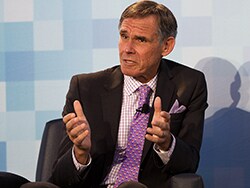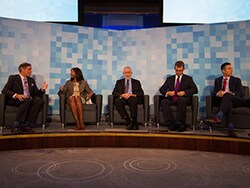An expert panel of physicians came together today in New York City to exchange questions, concerns, and experiences and discuss the road ahead in integrating precision medicine, pharmacogenomics, and targeted therapies in their own practices in a town hall meeting hosted by Medscape.
"Today, we have imprecision medicine," Medscape Editor-in-Chief Eric Topol, MD, who moderated a distinguished panel of physicians at the inaugural event, Medicine 3.0: Precision & Patients, noted in his opening remarks.

Dr Eric Topol
"Take screening mammography and prostate-specific antigen testing, where at least 60% are false-positive. That's not very precise. We have 12 million serious diagnostic errors a year...and that hasn't improved in 16 years," Dr Topol said. "The other thing that typifies this problem is our medications." Of the 20 leading drugs prescribed in the United States, "80% of patients are nonresponders. All these things set the stage for precision medicine," he said.
On January 20, 2015, in his State of the Union speech, President Barack Obama announced his plan to start the Precision Medicine Initiative "to bring us closer to curing diseases like cancer and diabetes, and to give all of us access to the personalized information we need to keep ourselves and our families healthier." Precision medicine targets individual variability in genes, environment, and lifestyle to tailor prevention and treatment approaches that maximize effectiveness.
The initiative hopes to recruit a cohort of one million or more individuals who will share their health data so that researchers can develop targeted therapies for cancer and other diseases on the basis of an individual's genetic and molecular profile. It represents a "new model of scientific research" in which patients are engaged partners, according to the draft principles released by the Obama administration.
Precision medicine will change and is changing the practice of medicine, but it won't happen overnight, said panelist Maurie Markman, MD, president, Medicine and Science, Cancer Treatment Centers of America, Philadelphia, Pennsylvania.

Drs Topol, Pegus, Markman, Weidner, and Smith
"There is no area of medicine that is in more of a transformation than cancer," Dr Markman said. But he encouraged the audience to think of precision medicine "not as an event, but as a process, a journey" and "we are in kindergarten."
Already, the field of precision medicine has had some "home runs," such as finding the true driver of a malignancy and developing a targeted therapy to successfully treat it in an individual patient, Dr Markman noted.
But for every home run, expect "lots of singles," added panelist Gregory R. Weidner, MD, medical director, Primary Care Innovation and Proactive Health, Carolinas HealthCare System, Matthews, North Carolina.
The Engaged Patient
The panelists noted that patients are taking a bigger role in their health and disease management than ever before, and physicians are adapting to this changing landscape. The increased availability and use of biometric devices, activity trackers, and health-related smartphone applications are fueling a population of patients more involved than ever in their personal health. On the front line, physicians are adapting their practice to accommodate a more engaged patient.
And the promise of precision medicine is not purely related to genomics, the panelists noted.
"We are learning that outcomes in cancer and recurrence risk are related to issues like weight, exercise, stress ― you can document all this, and these are areas that the individual has incredible individual control over. It's not just the biology of the cancer," Dr Markman commented.
Although genomics in precision medicine is "incredibly cool, what really excites me about the whole concept of precision medicine is the lifestyle learnings that we can gain from it," noted panelist Michael Smith, MD, MBA, CPT, chief medical editor at WebMD and an internist from Atlanta, Georgia.
"We know that most of our health is dictated by our lifestyle, not our genes, so the fact that we can potentially learn specifics about how our lifestyle translates into having a condition or not, and living longer and optimally, if precision medicine can contribute to that, the impact that we can have on people's health, both individually and as a population as a whole, is huge from my perspective," Dr Smith said.
Dr Topol cited the recent JAMA study that showed that for patients with heart disease, receiving individualized text messages about controlling their risk factors had a "pretty remarkable impact over 6 months in terms of favorable modification of multiple risk factors."
"While we are still at the early stages of precision medicine, and I prefer the term 'individualized medicine,' when you can get that granular at the individual level, it can make a big difference," Dr Topol noted.
Panelist Cheryl Pegus, MD, MPH, director, Division of General Internal Medicine and Clinical Innovation at the NYU School of Medicine in New York City, also sees huge value in precision medicine inside and outside of genomics. The promise of precision medicine lies in helping doctors and patients come together to manage health and disease more effectively and getting patients more engaged, she noted.
"We know today that about 30% of patients who see their physician leave not knowing what their diagnosis is or not understanding what is occurring, and more importantly, after that 15- to 30- minute visit, leaving and not going back for the next 4 to 6 months without having any information about how to guide their health," Dr Pegus said.
"Precision medicine will allow us to not only make a better diagnosis at that initial point of contact but also monitor the patient more closely and help them make healthy changes," she said.
Medscape Medical News © 2015
Cite this: Precision Medicine, Patient Engagement Focus of Medicine 3.0 - Medscape - Sep 29, 2015.











Comments